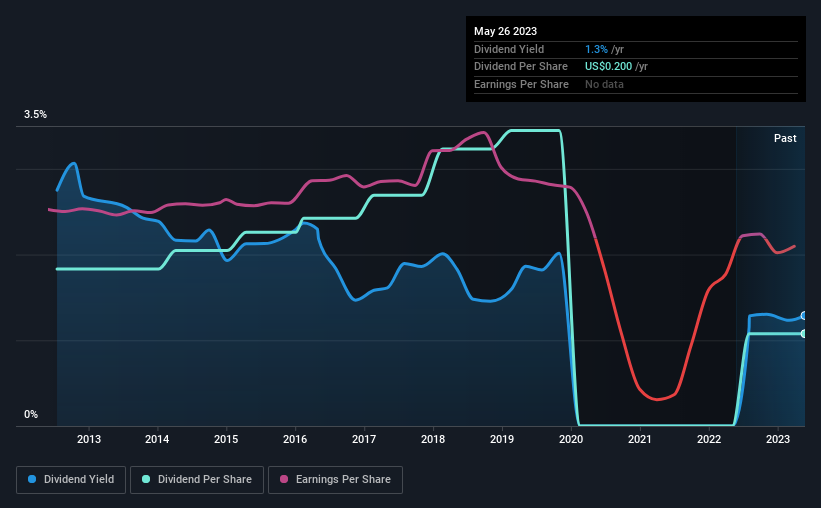We Wouldn't Be Too Quick To Buy The Marcus Corporation (NYSE:MCS) Before It Goes Ex-Dividend
Readers hoping to buy The Marcus Corporation (NYSE:MCS) for its dividend will need to make their move shortly, as the stock is about to trade ex-dividend. Typically, the ex-dividend date is one business day before the record date which is the date on which a company determines the shareholders eligible to receive a dividend. The ex-dividend date is important because any transaction on a stock needs to have been settled before the record date in order to be eligible for a dividend. This means that investors who purchase Marcus' shares on or after the 1st of June will not receive the dividend, which will be paid on the 15th of June.
The company's next dividend payment will be US$0.05 per share, and in the last 12 months, the company paid a total of US$0.20 per share. Based on the last year's worth of payments, Marcus has a trailing yield of 1.3% on the current stock price of $15.52. Dividends are a major contributor to investment returns for long term holders, but only if the dividend continues to be paid. That's why we should always check whether the dividend payments appear sustainable, and if the company is growing.
View our latest analysis for Marcus
If a company pays out more in dividends than it earned, then the dividend might become unsustainable - hardly an ideal situation. Marcus reported a loss after tax last year, which means it's paying a dividend despite being unprofitable. While this might be a one-off event, this is unlikely to be sustainable in the long term. With the recent loss, it's important to check if the business generated enough cash to pay its dividend. If cash earnings don't cover the dividend, the company would have to pay dividends out of cash in the bank, or by borrowing money, neither of which is long-term sustainable. What's good is that dividends were well covered by free cash flow, with the company paying out 12% of its cash flow last year.
Click here to see the company's payout ratio, plus analyst estimates of its future dividends.
Have Earnings And Dividends Been Growing?
Businesses with shrinking earnings are tricky from a dividend perspective. If earnings decline and the company is forced to cut its dividend, investors could watch the value of their investment go up in smoke. Marcus reported a loss last year, and the general trend suggests its earnings have also been declining in recent years, making us wonder if the dividend is at risk.
The main way most investors will assess a company's dividend prospects is by checking the historical rate of dividend growth. Marcus has seen its dividend decline 5.2% per annum on average over the past 10 years, which is not great to see. It's never nice to see earnings and dividends falling, but at least management has cut the dividend rather than potentially risk the company's health in an attempt to maintain it.
We update our analysis on Marcus every 24 hours, so you can always get the latest insights on its financial health, here.
The Bottom Line
From a dividend perspective, should investors buy or avoid Marcus? We're a bit uncomfortable with it paying a dividend while being loss-making. However, we note that the dividend was covered by cash flow. It's not an attractive combination from a dividend perspective, and we're inclined to pass on this one for the time being.
Ever wonder what the future holds for Marcus? See what the three analysts we track are forecasting, with this visualisation of its historical and future estimated earnings and cash flow
Generally, we wouldn't recommend just buying the first dividend stock you see. Here's a curated list of interesting stocks that are strong dividend payers.
Have feedback on this article? Concerned about the content? Get in touch with us directly. Alternatively, email editorial-team (at) simplywallst.com.
This article by Simply Wall St is general in nature. We provide commentary based on historical data and analyst forecasts only using an unbiased methodology and our articles are not intended to be financial advice. It does not constitute a recommendation to buy or sell any stock, and does not take account of your objectives, or your financial situation. We aim to bring you long-term focused analysis driven by fundamental data. Note that our analysis may not factor in the latest price-sensitive company announcements or qualitative material. Simply Wall St has no position in any stocks mentioned.
Join A Paid User Research Session
You’ll receive a US$30 Amazon Gift card for 1 hour of your time while helping us build better investing tools for the individual investors like yourself. Sign up here

